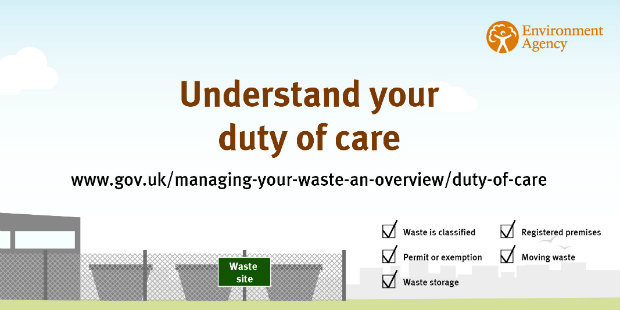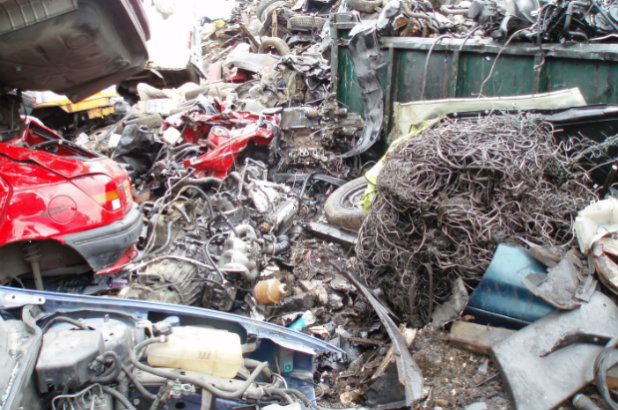Waste is an issue for all of us. We all create it and that means we are all responsible for what happens to it. Waste needs to be dealt with in the safest way possible.
Even as householders, we have responsibilities for waste. Usually this means putting our waste and recycling out for collection by our local council, or by waste collection services contracted by our local council. Largely as householders, we deal responsibly with waste, so it doesn’t harm the environment, by following the guidance supplied to us by local councils on how to dispose of our waste.
Duty of Care for businesses
Businesses all create waste that needs collecting and taking away for onward disposal, treatment or recycling. This involves a business finding an appropriate waste collection service. Businesses producing waste or managing waste on behalf of others, such as local councils and private collection companies, have a legal Waste Duty of Care.
The Waste Duty of Care expects waste producers to be responsible for knowing where they are sending their waste and taking steps to ensure those they contract to collect and manage their waste, are operating legally and are taking their waste to legal disposal, treatment and recycling sites.
Waste producers must keep records of who they send their waste to and how much they have sent. The easiest way to record this information is by using waste transfer notes and this can be done electronically using the Electronic Duty of Care system, Edoc. This system ensures waste producers are taking all the necessary steps to be compliant with their legal Waste Duty of Care.
The Government has recently produced, and consulted on, a revised Code of Practice to help businesses and public sector services take steps to ensure they are complying with the Waste Duty of Care.
Stopping waste crime
It is important to follow the Waste Duty of Care to stop waste entering the hands of illegal waste operators, who commit waste crimes by deliberately not dealing with waste in accordance with the law. Illegal waste operations include running a waste site without a permit; illegally exporting waste or large scale illegal dumping.
If you see or suspect illegal waste operations report it anonymously to Crimestoppers on 0800 555 111 or by visiting their website.



10 comments
Comment by Wiktor johnson posted on
Great article. Thanks for sharing. Indeed waste handling and management is a very important factor . If you want waste handling and management services, please have a look <a href=’http://www.ashwaste.com/’> here.</a>
Comment by Pete B posted on
Why is household recycling so difficult ?
Government should require all councils to standardise on bin collection colours for types of waste to recycle and should then require businesses to colour code packaging with a coloured code so people know which bin to put it in .
May take a few years to impliment but at least the public aren't confused .
Most people are happy to recycle but it's a bit confusing at moment .
Comment by Britney Perry posted on
Thanks for the information
Comment by IT Recycle UK posted on
Thanks for sharing this informative post.. keep writing..
it-recycle.uk/
Comment by Avilasha Mukherjee posted on
Who is, responsible for, garbage, removal, in, your, areas
Comment by eileenroffe posted on
Good morning, Councils are responsible for removing domestic waste and businesses arrange contracts with either the Council or regulated organisation to remove their waste. Fly-tipped waste in public areas is council responsibility and private land owners need to make arrangements to have it removed by a private organisation. - Eileen
Comment by Sel posted on
Are landfill sites owned by councils and operated by private companies, and if so, what is the balance of responsibilities for disposal greenhouse gas emissions between the council and the private companies running the landfills
Comment by Richard Northridge posted on
Can I ask a slightly different but related question: who owns waste? At some point in the chain from consumption to disposal there's a transfer of ownership yet the legislation relating to waste never refers to 'owners' only to 'holders' or 'controllers' of these materials. There seems to be a marked reluctance to address this point. Why? I would venture to suggest that if ownership were emphasized i.e. property rights made much clearer than is the case now, we would get much more engagement in this subject. No doubt, at an earlier time when these materials had negligible monetary value or, indeed, they represented a liability, no one was much interested. But those times have long past. Recyclate is valuable with all the indications in a resource depleted world it's value will increase. Don't we need to change the way we see waste - not as a problem to be got out the way as cheaply and efficiently as possible, but as a resource from which wealth can be created? Whilst this has been suggested by a number of people over the years, it never seems to have taken off and become mainstreamed. I would suggest that until we sort out property rights a vibrant market economy will never obtain traction.
Comment by wainehartman posted on
Good Morning, for information on who is responsible for waste please go to the following link on GOV.UK
https://environmentagency.blog.gov.uk/2015/09/17/who-is-responsible-for-waste/
Regards.
Comment by Etna Herbert posted on
Trying to get to a person or department responsible for overflowing bins and illegal dumping is like wading through treacle.
Is the system designed to make anyone trying to complain to give up.
I live in Harrogate and the state of some areas is a disgrace.
What happened to Beautiful Harrogate.